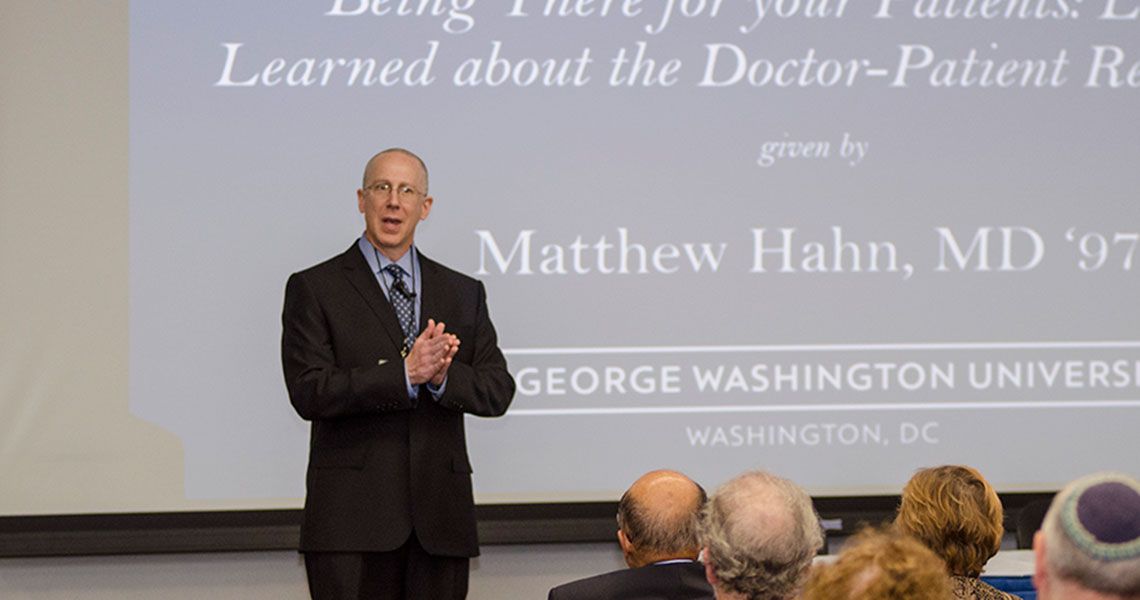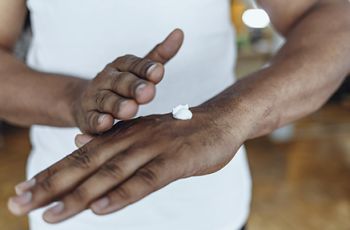It was two words from his physician-mentor, Stanley Talpers, MD, that struck Matthew Hahn, MD ’97: “Be there.”
Hahn was a first-year MD student, a “guinea pig” of sorts, he said, for the George Washington University (GW) School of Medicine and Health Sciences’ (SMHS) newly minted “Practice of Medicine” course, designed to explore the doctor-patient relationship. Talpers, associate clinical professor emeritus of medicine at SMHS, who embodied what Hahn pictured as a physician – tall, measured, comforting, thoughtful – had explained to a small group of students how to converse with patients. Then one student asked, “but what do we say when things are not going well? How do we talk to people if we’re delivering bad news?”
“The moment she asked that question, I realized, ‘That’s a good question, and I want to know the answer to that,’” Hahn recalled. “We all kind of leaned in, because we knew Dr. Talpers would have some kind of golden nugget for us … ‘Here’s what I will tell you: You have to be there.’”
“Being there,” as Hahn explained at the 12th Annual Stuart M. Fidler Memorial Lecture in early October, means “maintaining the humanity, the personal connection for patients in their medical experiences.” It’s a philosophy that Fidler would’ve approved.
“He was a superb physician,” recalled Robert Wilkinson, MD, MACP, associate clinical professor emeritus of medicine at SMHS, in his welcoming remarks. “He was knowledgeable, conscientious, and compassionate.”
Jane Fidler, his widow, said when her husband died, she received hundreds of letters from his patients. One in particular stood out, a perfect pairing to Hahn’s topic, “Being There for Your Patients: Lessons Learned about the Doctor-Patient Relationship.”
Fidler’s patient, a young woman just starting college, had diabetes. At every appointment, her vitals were good, her blood sugar on target, her weight healthy. But then she started shedding the pounds, gradually whittling down her frame until one of her final appointments with Fidler.
“‘He told me to get on the scale,’” Jane Fidler said, reading from the patient’s letter. “‘But as I got on the scale, he looked down and he saw that the numbers were perfect, the weight was where it should be.’ But he also saw that she was wearing big, heavy, clunky boots, a big, heavy sweater, and in each pocket of the sweater were apples, oranges, pears, a small cantaloupe, a couple of grapefruits. There was a veritable fruit salad in each of her pockets.”
Fidler gently persuaded the girl to remove her sweater and her boots, calculated her accurate weight, then gave her a recommendation for a GW therapist; he had, without saying a word, picked up on her deepening anorexia.
“‘His compassion and caring for what I was going through made all the difference to me ... He saved my life yet again,’” the patient wrote to Jane Fidler.
It’s that kind of connection that Hahn, now a family medicine practitioner and owner of River Bend Family Medicine in small-town Hancock, Maryland, seeks with every patient, regardless of prognosis. It is, he says, part of “being there.”
Take Ralph and Adele, a pair of his patients. A married nonagenarian couple, Ralph and Adele lived in a stately home – Grecian columns, beautiful furniture, lovely landscaping – and regularly visited their local doctor, Hahn.
Adele was the more frequent visitor of the two and Hahn’s very first patient; Ralph was resistant to check-ups, until he came in with a cough. “I remember what he said,” Hahn explained. “He said, ‘I have this terrible burning sensation in my chest, it’s like fire is coming up into my throat.’”
Hahn ordered a chest X-ray and diagnosed Ralph with lung cancer. “I thought, I need to discuss this with Ralph and Adele. … I like to discuss those types of things in person, if at all possible, and I had learned this great lesson: you have to be there.”
He decided to stop at their house on his way home, and Ralph was waiting out front. “Ralph is a real character. I’ll never forget the first thing he says: ‘Hey, doctor! I don’t think you got the message. You guys don’t do this anymore,’ referring to house calls. I said, ‘Ralph, you and Adele are friends, you’re in your 90s, I think you deserve such treatment.’”
So Hahn went inside their ornate home, where they fed him Chips Ahoy! chocolate chip cookies and Pepsi. Each time he tried to broach the subject of Ralph’s diagnosis, he was given more treats. “It actually felt like I had visited my doting grandparents and it was really being there that created this wonderful, wonderful moment.”
It was also Ralph, Adele, and the concept of “being there,” featured in one of his books, “Staying Alive: The Signs That You Have to See a Doctor Right Now (and the Ways to Avoid Having to See One Again),” that brought Hahn back to GW and Talpers.
“Wouldn’t [Dr. Talpers] want to know that his words so many years ago changed my life, changed the lives of my patients, changed the lives of my students, and now he’s the subject of a story that’s being published in my book?” Hahn asked.
He made an attempt to find Talpers, but soon gave up. His book came out, and he started on another. During the promotion of his second book, however, he was, through GW connections, put in touch with Jane Fidler. She not only informed him of the annual lecture endowed in her husband’s name, but she also mentioned that she did, in fact, know Talpers: he had been her husband’s medical partner for close to 40 years.
With Talpers’ phone number from Jane Fidler in hand, Hahn called his former mentor to tell him how “being there” had shaped him. “His response was exactly what I was hoping for. He said, ‘I’ve been retired for years now, I miss it every day, it is so wonderful to have you call me under these circumstances and let me know this.’
“So, faculty, students,” Hahn continued, “realize what you say and [what] you do can alter the lives of people around you. It can improve the lives of patients.”



